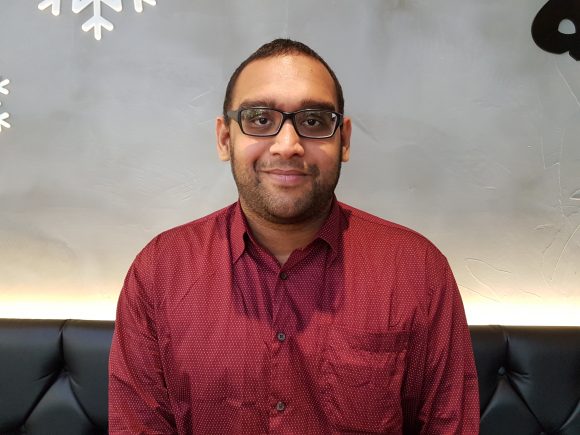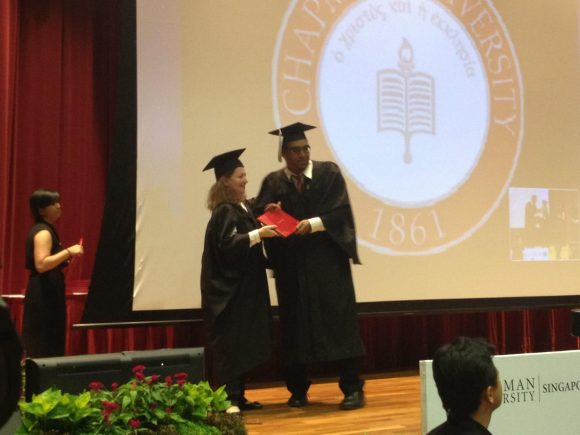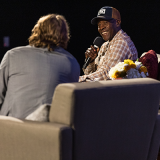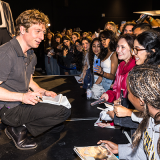
Alumni Spotlight – Justin Deimen
October 20, 2016
Every so often, we’ll be spotlighting alumni and what they are up to these days. These Q&A sessions will give you a bit of insight into where the world has taken them since graduation.
This week, the spotlight is on Justin Deimen (BFA/Creative Producing ’12).
DODGE: Share your career path with us – how did you get where you are now?
JUSTIN:
I’ve been lucky enough to have filled many roles through the years working across the globe, starting as a film journalist, a screenwriter, a creative executive, an independent producer, and now focusing on my role as a financier. In the middle of all that, I was also doing my Creative Producing BFA with Dodge in the Singapore Campus, where I honed in on what I wanted to do for the long-term.
After getting a degree in Communications in Singapore, I was a journalist for a short bit before going to Rotterdam to work for the film festival there. I met some great mentors there and was brought over to New York for another short brief stint at The Village Voice and VH1 before heading to London to work at TimeOut. I went back to Singapore after that to join the military. After a couple of years, I suppose the itch to start making my own films after writing about so many others’ kind of got to me then so I put steps in place to begin to own my journey as a producer, and now as a financier.

DODGE: Did you face any challenges in your transition from being a student at Dodge to entering the professional world?
JUSTIN:
Nothing particularly daunting, as the Professors did prepare us thoroughly over and over again. Managing expectations was key. Knowing what value you could bring to the table and what you couldn’t was important. What we learned at Dodge gave us an edge in modern-day producing. We could define our roles as creative producers in a part of the world that never really knew what a producer was capable of doing aside from “managing the production”. The more perspicacious producers ended up starting their own businesses to become creative entrepreneurs in fields that didn’t just involve film or production. Established business owners became snapping up Dodge graduates the moment they were available given the specialized skill sets that were handed down to us.
But quickly I begin to realize that the jobs offered weren’t what I wanted to do or even what I could do well so I became an “accidental entrepreneur” as it were. I started by own businesses and built them up with strong partners and mentors who gave me perspective on what was important in the industry and what wasn’t. It’s a tougher journey for sure, but nothing beats the freedom of setting your own path.
DODGE: What have you taken from the classroom and applied to your career?
JUSTIN:
I’ve always been a proponent of putting together co-productions, deep-diving into creative development, and of structuring the right financial deals. It’s what I’ve ended up basically doing on a day-to-day. I’m quite proud in the fact that I’m one of the few producers together with my partners who have put together more co-productions in the Southeast Asian region than others. I’ve valued inclusiveness in the industry more than anything else, and more often than not — it does pay off.
Many filmmakers and creatives don’t pay attention to the deal structure as much as they should. Every project we undertake is a business on its own — schedules, budgets, expectations, and returns. Especially when you’re using money that’s entrusted to you, it’s important to ensure you’re putting together the best deals possible and also sourcing around for the right investments. As producers, we’re not just filmmakers but business professionals as well.

DODGE: What skills do you believe have been essential to your profession?
JUSTIN:
I watched an average of 2 films a day for about 5 years. Different genres and languages and from different eras. It gave me a film vocabulary that became a refined tool to gauge a project’s tone and direction. I’ve slowed down on watching films now, but learning from others, seeing what can be improved on, and being able to dissect a film to its bare bones has always been something that has been useful to me.
Most importantly, I actually love the medium of filmmaking and television. I read anything I can get my hands on about Old Hollywood or different waves of cinemas through the decades and try to understand as much as the content business as possible and how it’s changing. Being able to find something you love about the business you’re in and holding on to that no matter how tough and ugly it can get – that’s a skill more people need to have.
DODGE: What is the best advice you have received and/or what advice would you give current students?
JUSTIN:
There are a few, actually.
HAVE BALANCE – Being a scriptwriter allowed me to work well on both sides of the coin, from the business to the creative and I applied that to the creative development and financing process.
It’s allowed me to get projects greenlit quicker than others may have because I always try to land on compromise — which is not a bad word. To me it just signifies respecting the opinions of both parties and wanting to find a way to preserve that relationship. But if terms are a step too far to take, be kind and gracious, and step back without taking it personally.
BE GENEROUS – Spend time teaching others and listening and try not to believe your own hype. If I didn’t have others do the same for me when I was younger, I’d have never made it. One of them is now a frequent collaborator, an adviser to my fund, and also co-founded with me the Southeast Asian Audio-Visual Association (SAAVA), a non-profit and the largest creative producing network in SE Asia where we train other producers as well as run the Southeast Asian Film Financing (SAFF) Forum where we match producers with financiers. You never know who’s going to be in your professional and personal life unless you reach out and take a chance on someone…which leads to the next point.
TAKE RISKS – I know it sounds rote but you’re never going to get what you want by waiting for it to come to you. That’s never how things work. Talk to that person you think may be able to help you get where you need to go. Do something that you always found an excuse to put off. What I found was that everything had a knock-on effect. It may not give you a direct benefit of what you wanted, but the act of doing something different always always always opens up new doors that leads to new paths.
Thank you for sharing, Justin!

